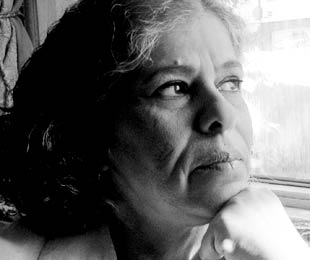

Features > January 4, 2008
"Resister in Exile:
"Haifa Zangana survived Saddam, and urges Iraqi women to survive the occupation"
By Sanhita SinhaRoy
On the Web at:http://www.inthesetimes.com/article/3460/resister_in_exile/

In This Article

City of Widows: An Iraqi Woman's Account of War and Resistance
By Haifa Zangana
Seven Stories Press · $20.00
When I met Haifa Zangana in Naperville, ILL., 30 miles southwest of Chicago, the former political prisoner under Saddam Hussen’s Baath regime was working on a column but was having computer problems. The interview appeared to be a needed distraction. Zangana, who writes regularly for the Guardian, al-Quds, Red Pepper and al-Ahram Weekly, is also a novelist and feminist...
Not as often as I would like. I have my immediate family there, and my husband’s [family] too. But there have been cases where people are kidnapped immediately upon stepping into the Iraqi airport. Each political party has its own militias. The airport is under the control of one militia. So it’s getting more and more difficult, if not impossible.
How’s your family doing?
They are carrying on, like my husband’s family who lives in a part of Baghdad that the Americans built a wall around.
This is the justification for it: “We are protecting people from the IEDs [improvised explosive devices] and we don’t want them to be randomly killed.” But at the same time there are air strikes that kill people randomly, so the justification doesn’t make sense except to separate and segregate people into smaller and smaller communities, which will make it easier for the occupiers to control them.
We are talking about Baghdad. There are also cities like Fallujah, Anbar and Samarra in the north, where walls are built to stop the coming and going of the people.
And it is not just the walls. The U.S. military was digging trenches around Al Hilla, the ancient city of Babylon, destroying an archaeological site to fill sandbags.
American archaeologists did fantastic work highlighting this issue. The problem was that once they left, the damage had already been done...
When you hear allegations or stories of torture, what goes through your mind?
It’s very sad. I am also outraged because we fought these practices for many decades and we thought we would end them.
But here we are with troops, with military occupation, with economic occupation and the cultural occupation. They try to erase our memory, our history, our archaeological sites and kill our civilians.
In four and a half years, we have lost 1 million Iraqis. And that’s terminated, physically. We’re not talking about the consequences of conventional weapons, the depleted uranium, the phosphorous, the cluster bombs.
As for detentions, the International Red Cross has recorded up to 60,000. And those are security detainees.
You’ve written that it’s dangerous now for women to even go to university.
Tremendously difficult. Because you have to defy almost everything, from the minute you step outside your house until you reach the university, and it is not even safe in the university. The assassination of academics, the targeting of professors, have left universities with a minimum presence of intellectuals.
There is a risk of being kidnapped, which is getting to be a very, very popular business. It depends on how affluent you are. That’s why people are fleeing the country. The fear of arbitrary arrest in the street. Of mortars dropping on you, IEDs, air strikes and snipers. Snipers are one of the main dangers because they shoot people as if to paralyze life in the city.
As for jobs, last year, because of the targeting of men, women are going out to deal with every aspect of life, including trying to find jobs.
The title of your book, City of Widows, alludes to the fact that many women have lost their husbands.
There are 90 widows made each day. The Ministry of Human Rights in Iraq—it’s funny we have one—says that there are 1 million widows in Iraq. In Baghdad alone there are 300,000 widows...
Many on the left in America debate whether an immediate withdrawal or a gradual withdrawal would be better. What do you think?
This gradual withdrawal is actually a gradual building of bases in Iraq. The call should be for immediate withdrawal.
People are concerned that if the Americans leave, Iraqis will kill each other. But that is the white man’s burden. Powerful nations believe it is their duty to liberate people and then look after them because they are incapable of doing it themselves.
You saw it in Algeria, in Vietnam and it’s now happening in Iraq.
We’re approaching five years since the start of the war in Iraq. Do you think the future looks hopeful or bleak?
Both. Bleak because of the reality of what Iraqis are going through. The death, the violence, the suffering and the despair, especially among women.
And hopeful, because we cannot live without hope. We have to be optimistic. Because Iraqis are not accepting what’s being enforced on them, there is hope. This is a credit to the Iraqi people.
This kind of resilience gives you hope. And Iraq, after all, is a country with thousands of years of history, and the occupation has been here only for five years. We are bound to put an end to it.
____________________________________














